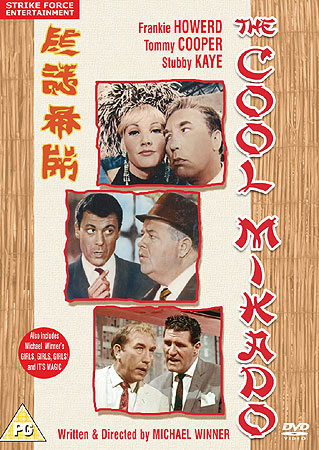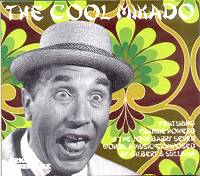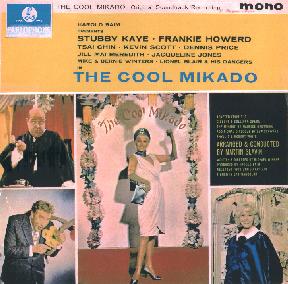The Cool Mikado (1962)
Musical Arrangement: Martin Slavin |
|
 SFE 9971005 |
This 1962 film is a very loose adaptation of The Mikado. Most of the reviews are awful, but if you watch with an open mind, the film is "so bad that it's good." I smiled most of the way through it. The only home video issues were on VHS in 1993 and DVD in 2009, both only in U.K. PAL format.
The Mander & Mitchenson picture history quotes advance publicity for the film as follows:
Into a totally new and modern story are woven Sullivan's beautiful melodies, after having them artistically up-dated for 1962-style enjoyment, by Martin Slavin. Gilbert's ever-sharp lyrics remain unchanged except for one small spot where topicality dictated a brief rewrite.
In a similar vein, the cover of the U.K. home video release describes the film this way:
It's the swinging sixties. Frankie Howerd and Tommy Cooper ham it up in this campy, comical, irreverent romp which encapsulates the true spirit of the 1960's.
Chris Webster, who describes the film as "dreadful," points out that Tommy Cooper, despite getting co-star billing, is in fact in only one short scene as Pooh-Bah the solicitor. As Chris puts it, "this is just a few minutes of Tommy doing some gags and tricks from his act. It bears no relevance to the film."
The essence of the new plot is as follows: Hank Mikado, son of Judge Herbert Mikado, has refused his father's order to marry Katie Shaw, an American Vamp. Hank joins the army and is posted to Japan where he meets and falls in love with Yum-Yum, a Tokyo art student. But, Yum-Yum is engaged to Ko-Ko, an American gangster now operating in Tokyo whose brother was sent to prison by Judge Mikado. Pitti-Sing and Peep-Bo here are tea-house girls and chaperones to Yum-Yum. There is no Pooh-Bah or Pish-Tush in the story. Nanki-Poo (played by Lionel Blair accompanied by his dance troupe) acts as a 'deus-ex-machina' in manipulating the action.
J. Donald Smith says that this "is a terrible movie but with some decent jazz send-ups." Geoffrey Dixon says that "this must be one of the worst films ever made. Not only is it a travesty of G&S. but it is also a travesty of the film-maker's art. Good as Frankie Howerd was in his own sphere, he was hopeless when faced with Gilbert & Sullivan. Witness his Learned Judge and his Sir Joseph [i.e., in the Walker Trial and Pinafore]"
To Howerd's credit, he regretted making the film. In Frankie Howerd: Stand-Up Comic, Graham McCann wrote: "Howerd (who was cast as Ko-Ko) would say 'without equivocation' that 'not only was it the worst film ever made, but was [also] the one production in show-business that I'm positively ashamed to have appeared in'" (p. 179).
Leon Berger observes: "I'm sure Michael Winner is on record as saying somewhere that he wanted to produce something quickly and cheaply to make some fast bucks. Howerd's career was then in the doldrums and could be hired for a song, and a whole host British TV comedians were desperate to break into films. Ignore the fact that it has anything to do with G&S and enjoy it as silly nostalgia from an innocent age.
Ian Lawson adds: "Yes, it's bad, but it has a kind of fascination frantic about it. My favourite moment musically and visually comes when Lionel Blair and the dancers perform the Tit Willow twist. Aaaargh! Amazing to think Michael Winner directed — his first outing in a career specialising in bad taste.
Here is Don Smith's full review:
This is a bad movie. Of course there are bad movies and bad movies. This one has an interesting concept but ultimately does not deliver, except for some excellent send-ups of the familiar G&S songs. Unlike its step-siblings (The Hot Mikado, The Black Mikado, etc.), The Cool Mikado uses only the story-line of The Mikado, as well as some of the songs and music, but not most of the dialogue.
Must be seen to appreciated: "Three Little Maids" cha-cha, "Flowers That Bloom in the Spring" jitterbug, and above all the "Tit-Willow" twist. Ko-Ko is introduced in "Behold the Lord High Executioner" by a chorus of gangsters straight out of Guys and Dolls. Stubby Kaye is a wise-cracking Judge Mikado of the Groucho Marx type and sings a rewritten "More Humane Mikado" in his best Brooklyn accent.
Katisha (Katie Shaw) is a vamp in the best Hollywood tradition. She does not sing but is accompanied by a sultry "Beauty in the Bellow of the Blast" whenever she appears. Yum-Yum sings "The Sun Whose Rays" while wearing a bikini at a hotel swimming pool. Between the two there is more exposed flesh in this film than appeared on the stage of the Savoy in the 104 year history of the D'Oyly Carte Opera. It is that kind of movie.
On Savoynet, Dan Kravetz had this not-as-scathing review:
I've seen The Cool Mikado, and it's far from the worst film I've ever seen (I've seen Robot Monster and Spencer's Mountain, for instance). That's not to say it's good, just passably mediocre. The story makes little sense, and is told in flashback. On an airliner leaving Japan, a gregarious tourist named Charlie Hogfleisch (Stubby Kaye) finds himself seated next to Hank Mikado (Kevin Scott) and his blonde bride Yum-Yum (Jill Mae Meredith). Hank explains that he had gone to Japan with the U.S. Army to escape the plans of his father, Judge Herbert Mikado of Whiskeyville, Illinois, for Hank to marry Katie Shaw. The flashback gets underway, and we meet Judge Mikado (Stubby Kaye, again) and Katie (Jacqueline Jones). Hank falls in love with Yum-Yum, who is the girl friend of gangster Ko-Ko Flintridge (Frankie Howerd). Yum-Yum hangs out with two actual Japanese characters, Pitti-Sing and Peep-Bo (every other principal character is a Westerner, including Pooh-Bah, a private detective, and Nanki-Poo, the owner of an espresso bar). Eventually, the Judge and Katie get themselves over to Japan to resolve the conflicts in the story, such as it is.
What about the music? Well, quite a lot of Mikado music gets played and/or sung, in "contemporary" arrangements mostly reminiscent of Percy Faith with little to strike one as the sound of the 'Sixties. Perhaps the idea of doing anything at all with a G&S score, so soon after the copyright ran out, was outrageous enough in those days. The opening credits are accompanied by "The sun, whose rays" with a rock beat; later, "Sing derry down derry" gets a big band treatment (without vocals), "Three little maids" is a kind of samba (not a cha-cha-cha as described on the DVD box), "Flowers that bloom" is Dixieland and "Titwillow" is introduced as "The Mikado Twist" (also without vocals). Everything else is more or less straight, with some updated lyrics for Kaye's "My object all sublime." The notes on the DVD box also describe "Behold the Lord High Executioner" as having "Tijuana brass backing"—nonsense; there is nothing faintly Mexican or Mariachi about the accompaniment, the brass fanfares being essentially Sullivan's own.
Curiously, there is nothing for Katie Shaw or Pooh-Bah to sing, unless some footage is missing from this print. Much of what is enjoyable in the film is due to the presence of the wonderful Stubby Kaye, a rotund singer-dancer-comedian not unlike Jason Alexander. Kaye became famous for creating two supporting roles in Broadway musicals and recreating both on film: Third-banana Nicely-Nicely Johnson in Guys and Dolls and Second-banana Marryin' Sam in Li'l Abner. We're lucky to have this much more of him preserved for posterity. The Cool Mikado is an interesting curiosity, and I don't feel in any way cheated out of my nine pounds by Amazon.co.uk.
 El Records ACME34CD |
There was an LP release of the sound track, but it is very rare. Two U.K. antiquarian dealers told Chris Webster that it would be priced today at about GBP 60.00. Chris says that the film itself is "very bad," something that even the director (Michael Winner) is supposed to have acknowledged. However, there are enough Frankie Howerd, Tommy Cooper, Michael Winner, and John Barry fans to make the sound track a collectors' items.
In 2002 the small independent label El Records released the sound track on CD. The recording must be appreciated — if it be appreciated at all — on its own terms, and not as a recording of The Mikado. The orchestrations by John Barry are souped up, although still recognizable. The singers deliver their lines with American accents, in a style that might have been popular in 1962. The transfer to CD is very well done, and in fact I would never have guessed this was a 1962 recording, at least sonically speaking!
| Date | Label | Format | Number |
|---|---|---|---|
| 1962 | United Artists | Film | [no number] |
| 196-? | Parlophone | LP | PMCM 119 |
| 1993 | Fabulous Films Ltd. | VHS PAL | BCC 04041 |
| 2002 | El Records | CD | ACME34CD |
| 2009 | Strike Force Entertainment (SFE) | DVD PAL | 9971005 |

